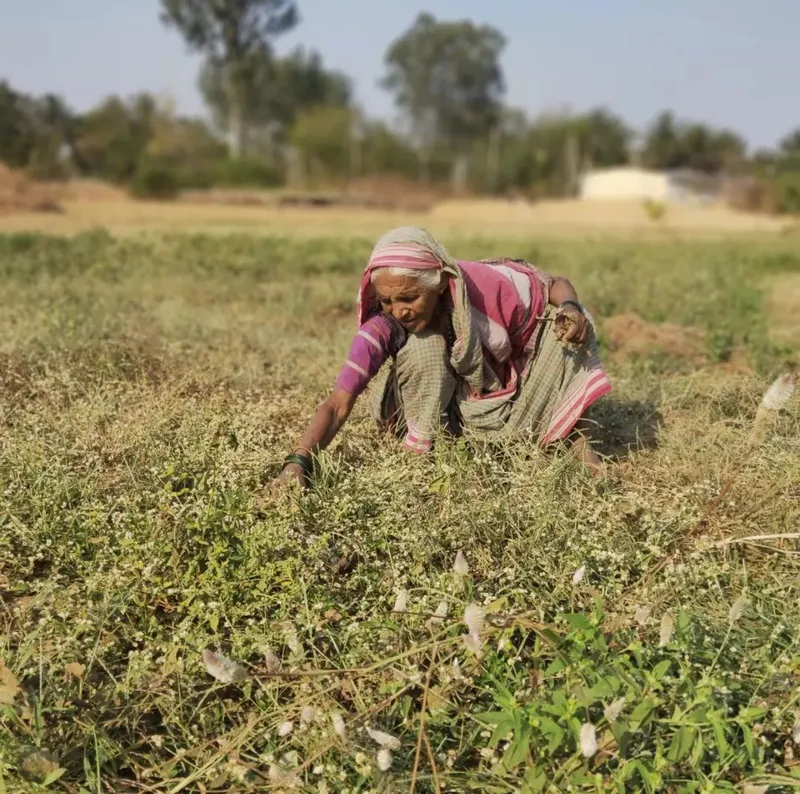How Organic Farmers Market in Chennai has created a fair price market for over 300 organic farmers
Organic Farmers Market, the brainchild of Ananthoo and his friends, have transformed the food distribution chain, ensuring a win-win for both the farmers and the consumers. While farmers get back the minimum production cost, consumers get a variety of chemical-free vegetables at a fixed price.
Over 16 years ago, Ananthoo, then a telecom engineer in Chennai, was buying grapes in his neighbourhood when he was told that they cost Rs 45 a kilo.
To understand the dynamics behind this pricing, Ananthoo, along with a few friends, decided to trace the journey of the fruits to the farm where they were cultivated.
They went all the way to Madurai, which is over 455 km from Chennai, where the grapes were sold for Rs 30 a kilo. They were transported to Madurai from the nearest village, where the local sellers were selling them for Rs 8 a kilo.
Ananthoo and his friends finally traced the grapes to the farmer who cultivated them. He was selling the grapes for a mere Rs 3 per kilo.
“If only we could look into the economics of our fruits and vegetables, we would find a shocking disparity in the prices at every level of exchange,” says Ananthoo.
What he learned that day led Ananthoo, his wife Sumathi, their friends Usha Hari, Sangeetha Sriram, Radhika Rammohan and Meera Rammohan, and their spouses to start ‘Restore’, a store in Chennai, for farmers to access fair prices and a good market for their produce.
Restore’s founding principles have today evolved into a pan-Indian agro-economic and clean consumption movement called the Organic Farmers Market (OFM), impacting the lives of more than 300 farmers across Tamil Nadu, Karnataka, Andhra Pradesh, Kerala, Rajasthan, and some parts of Himachal Pradesh.

OFM works with farmers across India, helping them with resources to switch to and sustain organic farming methods. Here is a farmer from OFM's network in Karnataka.
OFM functions on five broad principles: guaranteed and consistent availability of safe food for farmers, fair pricing of organic products for both the farmer and the consumer; protection of livelihoods for organic farmers; awareness on safe food and current agricultural practices/malpractices; and transparency and traceability of produce to the farm.
The agro-economics of OFM
During their early years of research, Ananthoo and his team found that an unfair market had led farmers to end their lives, some of them unable to pay back loans as low as Rs 15,000.
“Agriculture is a sector wherein months of a farmer’s work can be wiped out over one unseasonal rain, one batch of infestation by pests or one abnormally hot day,” says Ananthoo.
“There is huge risk at any given time,” he adds.
Realising the stark imbalance in prices for farmers who had little to fall back on but a lot at stake, OFM decided to transfer the agency of pricing on to the farmers, also encouraging them to cultivate seasonal, organic produce alongside.
“We ask the farmers to fix the price for their harvest based on the cost of production (manual labour, seeds, equipment, manure etc.) To further offset challenges, we help them cultivate a diverse range of vegetables organically as opposed to putting all their stakes on one crop,” says Ananthoo.
OFM started off with a handful of farmers from Tamil Nadu and Karnataka.
Dharani Vendhan, a 32-year-old farmer from a village in Arani, Tiruvannamalai in Tamil Nadu, persisted with agriculture even when his peers from generational farming families left the village for better paying jobs in the army or the manufacturing industry or as drivers.
His family had always been farming organically, and Dharani wanted to continue their legacy.
Until about a decade ago, Dharani was cultivating only one variety of greens–the siru keerai. Later he began sowing multiple varieties such as amaranth, paalak, and coriander owing to better demand.
However, this spiked his production cost from a few hundred rupees per kilo to Rs 1,000 for the same quantity of greens. But his selling cost did not exceed Rs 700 a kilo, leading to a loss of Rs 300 after every harvest.
In 2015, the well that provided water for his crops caved in, leaving Dharani with no water to sustain his crops.
At that point, OFM not only helped him raise funds to rebuild the water source and provided new equipment, but it also ensured Dharani made up for the loss he faced during the harvest season by helping him sell his produce at a marginally higher price.
“We see OFM taking into account all the risks and uncertainties that farmers face, which is something the government should be doing,” he says.
Many times, organically grown vegetables perish during transportation, which is unaccounted for, he adds.
So, OFM initiated the concept of transporting the produce through local buses from villages to Chennai; this also reduces fuel consumption.
Vegetables are transported by OFM to its stores across Chennai and they are sold at one standard price throughout the year.
Ananthoo says this is beneficial for both the farmer and the consumer. It ensures farmers get back the minimum production cost, including that of labour and inputs, and consumers are able to avail themselves of a variety of chemical-free vegetables at a fixed price throughout the year.
“This makes both parties immune to market fluctuations,” he adds.
OFM stores are managed by volunteers who are passionate about the organic farmers’ movement. They get little to no monetary benefits from OFM, which is a self-funded and crowdfunded movement.
“We started out with Rs 30 a kilo for all vegetables, which we sold out of a garage in Chennai in 2007 for a few years. Our farmers, who had received a fraction of their production costs for so many years, were happy with just this pricing,” says Ananthoo.
Today, after 10 years of operation, OFM has a collective of 15 cooperative stores in southern India, where the organic produce from the farmers is sold at fair prices. Many of the farmers are also growing produce commercially for the mainstream market.
At these stores, vegetables are priced anywhere between Rs 50 and Rs 60 for the whole year, with exceptions made for farmers who have had a lean harvest or suffered losses of crops or property.
G Ganesan of Thanjavur has been farming since he was 11 years old. He got introduced to Ananthoo through veteran organic farmer and educator Nammalvar about a decade ago.
Ganesan, a multi-crop farmer, sold all his vegetables for Rs 20 per kilo before he met Ananthoo. With the minimum price guarantee from OFM, he has been steadily increasing the prices of his vegetables by a few rupees every year.
“My association with OFM and Restore has brought me six new stores as customers today,” he says.
“Many of them come back with more customers, now that the quest for consuming organic vegetables is higher. We see that farmers like us can scale too,” says Ganesan.
A huge part of OFM’s work is awareness building.
“We’ve gone to schools, colleges, and even public spaces like the beach to explain our model and sell our produce, and consumers have been very receptive,” elaborates Ananthoo.
“It is through their conviction and word of mouth that we have grown to what we are today,” he adds.
Recognition from the government
In 2012, Restore was among the few stores in Chennai selling millets. Shanta Sheela Nair, a senior IAS officer, was buying from the store.
After Nair became the vice chairperson of the Tamil Nadu State Planning Commissison, Ananthoo and his team were asked to organise a daylong millet workshop at IIT Madras, along with the State Planning Commission.
At this workshop, organic farming experts, traditional medicine practitioners, and 20 IAS officers were provided a 10-course millet meal.

Urging urbanites to switch to native and organically grown foods has been a mission for OFM. Here is tea made from avaram poo, a flower of a leguminous tree growing in Tamil Nadu, which is known for its cooling, anti-diabetic properties.
The government’s involvement and awareness campaign helped in scaling millets from being just a bird feed–which was the case over a decade ago–to becoming a healthy alternative for human consumption.
Over the years, more farmers from the OFM network have started growing millets, which are climate resistant and can thrive in extreme climatic conditions. In the long run, they benefit the farmer, says Ananthoo.
Creating healthier food options
Batting for organic vegetables, Ananthoo says use of chemicals–in production, processing and storage–is detrimental to farmers in the long run, as costs run higher and the returns are way lesser, as these crops cater to a larger market that benefits farmers the least.
“Not to mention it is hazardous even for consumers to have these chemicals become a part of their daily consumption,” he adds.
OFM encourages the farmers in its network to price their harvest a few rupees higher than the market price, thus helping them earn a premium.
The sources of OFM’s vegetables are traceable to the farm and the farmer who grew them. Each farmer is audited by OFM’s members before any product is purchased.
“Through all these measures, in spite of our urban operations and markets, we have genuinely touched countless rural livelihoods and farmers,” says Ananthoo.
Edited by Swetha Kannan






